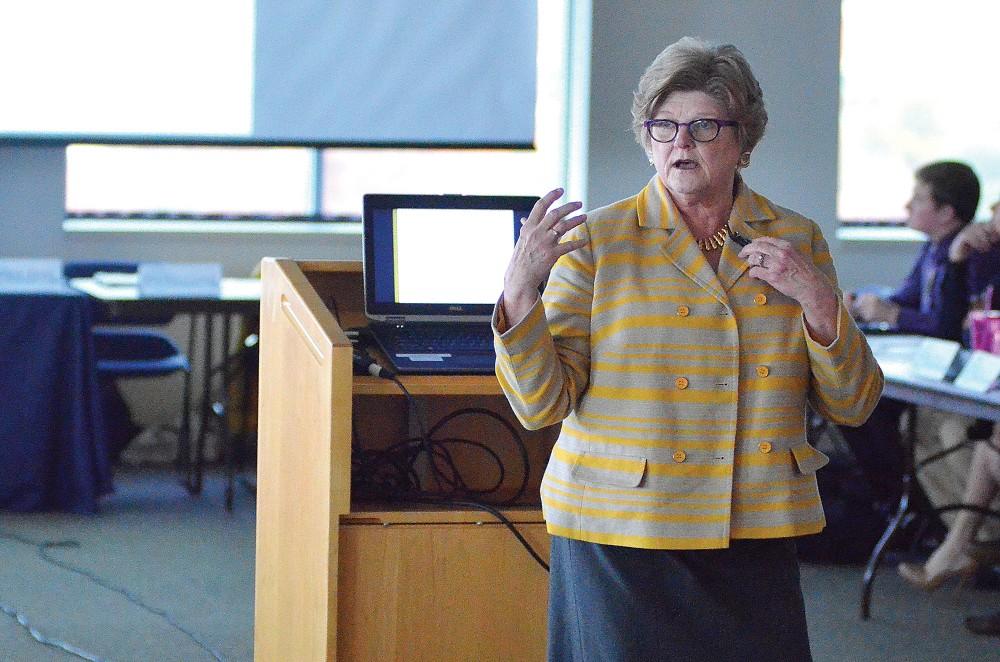Student Senate promotes open access for all

GVL / Nathan Kalinowski Lee Van Osen speaking at the recent Student Senate meeting.
Oct 20, 2013
Grand Valley State University’s Student Senate members are spreading awareness about the importance of free information this week during International Open Access Week.
At Thursday’s Student Senate meeting, guest speaker Lee Van Orsdel, dean of University Libraries, explained a little more about the Open Access program, which aims to make scholarly research articles accessible to the public for free rather than requiring readers to pay publishers for subscriptions.
Van Orsdel said older generations haven’t demanded free access to information, and in the past it has been the norm that scholars give the rights of their works to the publishers. Then, either libraries or students have to pay the publishers to access the content.
Since the invention of the Internet, the idea that all information should be accessible and free for anyone has been planted in the minds of the current generation.
“Information is truly meant to be shared,” Van Orsdel said, adding that she believes this generation will be the one to make sure that free and open access to scholarly articles, journals and research will become a reality.
Student Senate will partner with University Libraries, the Honors College and the Office of Undergraduate Research and Scholarship to hold a Facebook campaign this week to raise student awareness of the importance of open access for everyone.
Student senators and others will be changing their Facebook cover photos and profile pictures to items that promote International Open Access Week. Participants will also be posting status updates about open access with links to videos with more information about the program and how students can get involved.
However, this is only the first step in raising awareness and creating open access for everyone.
“Later in the year, at a date yet to be determined, Dean Lee Van Orsdel and I will be giving a lecture for any interested students and faculty about the value of open access for GVSU, the state of Michigan and the entire world,” said Scott St. Louis, vice president for Educational Affairs of Student Senate.
In August, St. Louis took a trip to Budapest to represent the GVSU Student Senate at the General Assembly of the Right to Research Coalition. The mission of the coalition is to help develop a more cost-effective way for scholarly research to be published and distributed through free and open access to academic journals and other educational materials.
“As a member of the North American Coordinating Committee of the Right to Research Coalition, I am responsible for using GVSU as something of a laboratory in which to determine best practices for how to create student movements in support of open access on university campuses,” St. Louis said.
GVSU started its own free and public access program five years ago. Research done by students and faculty is made available for free to people all over the world through the website scholarworks.gvsu.edu. Since the website opened, there have been 700,000 full-text content downloads in more than 140 countries.
“With open access, the work of Laker scholars has become truly global in reach,” St. Louis said.
Both St. Louis and Van Orsdel said open access to scholarly works could also mean, in some cases, free access to textbooks for students. Open access would also allow scholars to comment and build their own ideas on other scholarly works.
In the current system, many of the published works are only available on the Internet in PDF format; however the this doesn’t always allow for easy searching on the web. Open access wouldn’t use the PDF format, making searching for scholarly works much more efficient.
There has already been some progress nationally for open access. In February, the Obama administration’s Office of Science and Technology Policy created a policy that requires any federally funded research teams to release the data they find on a free and public database within a year of publication, since taxpayers are funding the research.
However, Van Orsdel said the policies could be thrown out at the end of the Obama administration. Van Orsdel added that she hopes spreading awareness and having more students take action will help put a more permanent free and public access plan into place.






















